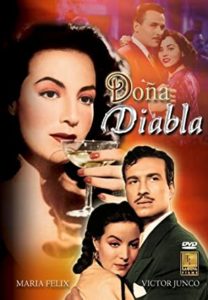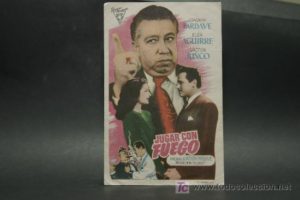 VICTOR JUNCO, DESTACADO ACTOR EN LA ÉPOCA DE ORO DEL CINE MEXICANO. (Descendiente Cubano).
VICTOR JUNCO, DESTACADO ACTOR EN LA ÉPOCA DE ORO DEL CINE MEXICANO. (Descendiente Cubano).
Víctor Junco Tassinari nació un 18 de junio de 1917 en Veracruz, Mexico, era hijo de Silvio Junco, cubano y Enriqueta Tassinari de origen Italiano, tuvo dos hermanos Tito Junco, tambien actor y Luisa Junco. Victor al igual que su hermano Tito fueron actores de aquella epoca dorada del Cine Mexicano, siendo Victor ganador de un premio Ariel. Tuvo la oportunidad de trabajar además en el cine de España, Francia y Estados Unidos.
A mediados de los años treinta, acompañado de su hermano Tito, se estableció en la Ciudad de México para asistir a clases de actuación en el Instituto Nacional de Bellas Artes, a la par tomo clases de arte dramático con el celebre maestro Japonés Seki Sano. Pronto consigue sus primeras intervenciones en cine como extra y forma parte del grupo Teatro de medianoche, fundado por Rodolfo Usigli.
https://youtu.be/C-oebnSehIY
FIlm “Victimas del Pecado”.
Sus primer rol importante se lo da el famoso director Emilio “Indio” Fernández en la película ‘Las abandonadas’ (1945), junto a Dolores del Río y Pedro Armendáriz, luego vendría su primer protagónico en ‘Rosa del Caribe’ (1946) con María Elena Marqués y Katy Jurado. En 1947 trabaja bajo las órdenes de Roberto Gavaldon, conocido como “el ogro”, por su fuerte temperamento en la cinta que le daría una nominación al Ariel: ‘La otra’ (1946). Después del éxito de La otra filma títulos como ‘La bien pagada’ (1948), con María Antonieta Pons y Blanca Estela Pavón, ‘Nocturno de amor’ (1948) con Miroslava Stern, ‘Coqueta’ (1949), con Ninón Sevilla, ‘Secreto entre mujeres’ (1949) con Rosario Granados y Carmen Montejo, ‘Amor salvaje’ (1949), con Rosa Carmina y ‘Doña Diabla’ (1950) con María Félix.
Film “Coqueta”.
En 1953 fundó el Teatro Arena, donde debutó como productor con la obra ‘El caso de la mujer asesinadita’. Fue también miembro fundador de la ANDA en donde fue nombrado Secretario del interior, fue además primer presidente de la ANDI. En cine siguió con sus éxitos y alternando las grandes actrices como Libertad Lamarque en ‘Te sigo esperando’ (1952) y ‘La mujer x’ (1955), Marga López en ‘Amor con amor se paga’ (1950) y ‘Tu hijo debe nacer’ (1958). También fue galán de Ninon Sevilla, Amalia Aguilar, Lilia del Valle, Lilia Prado, Rosa Carmina, Gloria Marin, Silvia Pinal y Elsa Aguirre, entre otras.
En 1956 el actor fue abordado por Hollywood para interpretar al general Lorenzo, en el western de Richard Fleischer ‘Bandido’, con Robert Mitchum en el papel estelar. Su incursión en el cine internacional no se detiene ahí, también trabaja en la producción franco-mexicana ‘La fièvre monte à El Pao’ (1958), con dirección de Luis Buñuel y con actores como María Félix, Gerard Philipe y Jean Servais. En 1963 filma la producción México- Argentina ‘La diosa impura’ con Isabel Sarli y Julio Alemán, quienes terminaron peleados al final del rodaje, en esta película interpretó el papel que estaba destinando para Pedro Armendáriz, quien se suicidó poco antes de iniciado el rodaje.
http://youtu.be/PbjzlsUn9Pc
Film ‘El Esperado amor desesperado’.
Posteriormente, trabaja junto a Lana Turner, en ‘The Big Cube’ (1968), dirigida por el cineasta de origen chileno Tito Davison, luego vendría ‘The Undefeated’ (1969) con John Wayne y Rock Hudson. Su última aparición internacional fue en 1982 en la película de Carlos Saura ‘Antonieta’, protagonizada por Isabelle Adjani y en la que interpretó al generalísimo Porfirio Díaz.
Además de seguir en el cine, en donde también incursiono en el llamado Cine fantástico con figuras como Blue Demon y El Santo, también hizo trabajos en televisión, debutando al lado de la diva de las telenovelas Lucia Méndez, en el melodrama ‘La maestra Méndez’ (1973). En 1974, incursionó en la escritura de guiones para ‘Aventuras de un caballo blanco y un niño’, una película de aventuras dirigida por Rafael Baledón. Pese a su prestigio ganado como actor, su único Ariel lo obtiene hasta 1981, tras casi 50 años de carrera, por su actuación en la cinta ‘Misterio’.
Víctor se casó sólo una vez, con Rina Pasquini Trachi, cantante, bailarina y actriz italiana conocida artísticamente como Rina Valdarno, con quien procreó a su única hija Enriqueta Balbina, conocida como Jacqueline. El matrimonio terminó en divorcio.
Victor Junco falleció el 6 de junio de 1988 en México, D.F. a los 71 años de edad. Sus restos descansan en el Panteón Mausoleos del Ángel en la rotonda de actores en México.
Premios Ariel
1947 Coactuación masculina La otra Nominado
1981 Coactuación masculina Misterio Ganador
Filmografía
Algunas de sus ultimas Presentaciones.
Garra de tigre (1989)
“De pura sangre” (1988) Telenovela …. Homero
Conexión México (1987)
Relampago (1987) …. Benicio Domínguez
Último desafio, El (1987)
Pandilla infernal, La (1987) …. Rafael
Cartucho cortado (1986)
Movidas del mofles, Las (1986)
Padre Juan, El (1985)
Asalto en Tijuana (1984)
Carro de la muerte, El (1984)
Traficante II, El (1984)
Dos matones, Los (1983)
https://youtu.be/IDF0v79zCbE
Film “La Mujer del Puerto”.
Mercenários de la muerte (1983) …. Comisario Raúl
Preparatoria (1983)
Pura y dos con sal, Una (1983)
“Quiéreme siempre” (1982) Telenovela …. Don Felipe
Antonieta (1982)
India blanca, La (1982)
“Al final del arco iris” (1982) Telenovela …. Federico
Gran triunfo, El (1981)
Héroe desconocido, El (1981) …. Don Ramón
Novia, esposa y amante (1981) …. Ingeniero
Misterio (1980) …. director de telenovela
Vivir para amar (1980)
Pesadilla mortal (1980)
… aka Derecho de vivir, El (México: subtítulo)
 VICTOR JUNCO, OUTSTANDING ACTOR IN THE GOLDEN ERA OF THE MEXICAN CINEMA. (Cuban descendant).
VICTOR JUNCO, OUTSTANDING ACTOR IN THE GOLDEN ERA OF THE MEXICAN CINEMA. (Cuban descendant).
Víctor Junco Tassinari was born on June 18, 1917, Veracruz, Mexico, was the son of Silvio Junco, Cuban and Enriqueta Tassinari of Italian origin, he had two brothers Tito Junco, also an actor and Luisa Junco. Victor, like his brother Tito, were actors of that golden age of Mexican Cinema, being the winner of an Ariel award. He also had the opportunity to work in cinema in Spain, France, and the United States.
In the mid-thirties, accompanied by his brother Tito, he settled in Mexico City to attend acting classes at the National Institute of Fine Arts, while taking dramatic art classes with the celebrated Japanese teacher Seki Sano. Soon he got his first film appearances as an extra and was part of the Teatro de Midnight group, founded by Rodolfo Usigli.
His first important role is given by the famous director Emilio “Indio” Fernández in the movie ‘Las abandonadas’ (1945), along with Dolores del Río and Pedro Armendáriz, then his first leading role would come in ‘Rosa del Caribe’ (1946) with María Elena Marqués and Katy Jurado. In 1947 he works under the orders of Roberto Gavaldon, known as “the ogre”, for his strong temperament in the film that would give him a nomination for Ariel: ‘The Other’ (1946). After the success of La otra films titles such as ‘La bien pagada’ (1948), with María Antonieta Pons and Blanca Estela Pavón, ‘Nocturno de amor’ (1948) with Miroslava Stern, ‘Coqueta’ (1949), with Ninón Sevilla, ‘Secreto entre Mujeres’ (1949) with Rosario Granados and Carmen Montejo, ‘Amor Salvante’ (1949), with Rosa Carmina and ‘Doña Diabla’ (1950) with María Félix.
In 1953 he founded the Arena Theater, where he debuted as a producer with the play ‘The case of the murdered woman’. He was also a founding member of ANDA where he was appointed Secretary of the Interior, he was also the first President of ANDI. In cinema, he continued with his successes and alternating the great actresses such as Libertad Lamarque in ‘I keep waiting’ (1952) and ‘La mujer x’ (1955), Marga López in ‘Amor con amor se paga’ (1950) and ‘Tu hijo must be born ‘(1958). He was also a lover of Ninon Sevilla, Amalia Aguilar, Lilia del Valle, Lilia Prado, Rosa Carmina, Gloria Marin, Silvia Pinal, and Elsa Aguirre, among others.
In 1956 the actor was approached by Hollywood to play General Lorenzo, in Richard Fleischer’s western ‘Bandido’, with Robert Mitchum in the starring role. His foray into international cinema does not stop there, he also works in the Franco-Mexican production ‘La fièvre monte à El Pao’ (1958), directed by Luis Buñuel and with actors such as María Félix, Gerard Philipe and Jean Servais. In 1963 he filmed the Mexico-Argentina production ‘La diosa impura’ with Isabel Sarli and Julio Alemán, who ended up fighting at the end of filming, in this film he played the role he was assigned for Pedro Armendáriz, who committed suicide shortly before filming began.
Subsequently, he worked with Lana Turner in “The Big Cube” (1968), directed by Chilean-born filmmaker Tito Davison, then “The Undefeated” (1969) with John Wayne and Rock Hudson. His last international appearance was in 1982 in Carlos Saura’s film ‘Antonieta’, starring Isabelle Adjani and in which he played the generalissimo Porfirio Díaz.
In addition to continuing in the cinema, where he also ventured into the so-called Fantastic Cinema with figures such as Blue Demon and El Santo, he also made works on television, debuting next to the soap opera diva Lucia Méndez, in the melodrama ‘La maestra Méndez ‘(1973). In 1974, he ventured into scriptwriting for ‘Adventures of a White Horse and a Child’, an adventure film directed by Rafael Baledón. Despite his earned prestige as an actor, his only Ariel was obtained until 1981, after almost 50 years of career, for his performance in the film ‘Mystery’.
Victor was married only once, to Rina Pasquini Trachi, Italian singer, dancer, and actress known artistically as Rina Valdarno, with whom he had his only daughter Enriqueta Balbina, known as Jacqueline. The marriage ended in divorce.
Victor Junco passed away on June 6, 1988, in Mexico, D.F. at 71 years of age. His remains rest in the Mausoleos del Ángel Pantheon at the actors’ roundabout in Mexico.
(READ VICTOR JUNCO LAST PERFORMANCES, AWARDS, AND NOMINATION IN THE SPANISH SECTION ABOVE).
Agencies/ Various/ Wiki/ Internet Photos/ YouTube/ Arnoldo Varona/ www.TheCubanHistory.com
THE CUBAN HISTORY, HOLLYWOOD.










